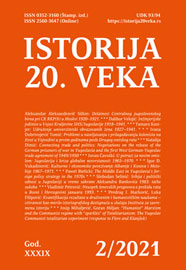NEUSPEH ŽENEVSKIH PREGOVORA O PREKIDU RATA U BOSNI I HERCEGOVINI JANUARA 1993.
FAILURE OF GENEVA PEACE TALKS TO END WAR IN BOSNIA IN JANUARY 1993
Author(s): Vladimir P. PetrovićSubject(s): Local History / Microhistory, Political history, Studies in violence and power
Published by: Institut za savremenu istoriju, Beograd
Keywords: Bosnian War; International Conference on Former Yugoslavia; Slobodan Milošević; Radovan Karadžić; Franjo Tuđman; Alija Izetbegović; Vance-Owen Peace Plan
Summary/Abstract: The International Conference on the Former Yugoslavia was created in London in August of 1992 as an instrument for the negotiations conducted by the United Nations and the European Community, represented by Cyrus Vance and Lord David Owen. Until the end of the year, they developed a detailed proposal to settle the Bosnian conflict, known as the Vance-Owen Peace Plan (VOPP). The VOPP was presented to the leaders of the warring factions in Geneva during the first session of talks in January of 1993. On the basis of archive material, judicial records, published documents, and memoirs of the participants, this article aims to reconstruct the dramatic negotiation process, which consisted of several rounds. An analysis of the declared Bosnian, Serbian, and Croatian positions during the negotiations, as well as the interactions among the delegations and relations within them, reveals that all the parties were had been deeply engaged in double dealing. The Croatian side was seemingly ready to sign the VOPP but was undermining it by launching a conflict in the field at the same time. The Serbian side was escalating as well, the Bosnian Serb leaders were not ready to accept the plan, despite the suggestions they had received from Belgrade. Sarajevo was procrastinating, hoping for a direct US involvement in the crisis following the inauguration of the new Clinton Administration. That administration did undermine the plan, which damaged the credibility of the international negotiators. In such circumstances, the plan had slim chances of succeeding. Although a ceasefire would have shortened the Bosnian war by almost three years and cut human losses by at least half, the main negotiators found a compromise solution to be unacceptable. As they defined and propagated maximalist goals, acceptance of a compromise was both damaging their grip on power and defying their worldview.
Journal: Istorija 20. veka
- Issue Year: 2021
- Issue No: 2
- Page Range: 435-460
- Page Count: 26
- Language: Serbian

